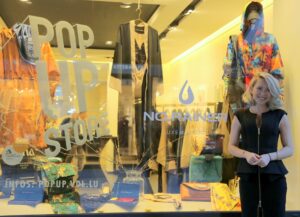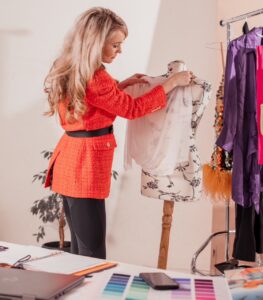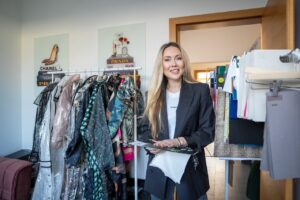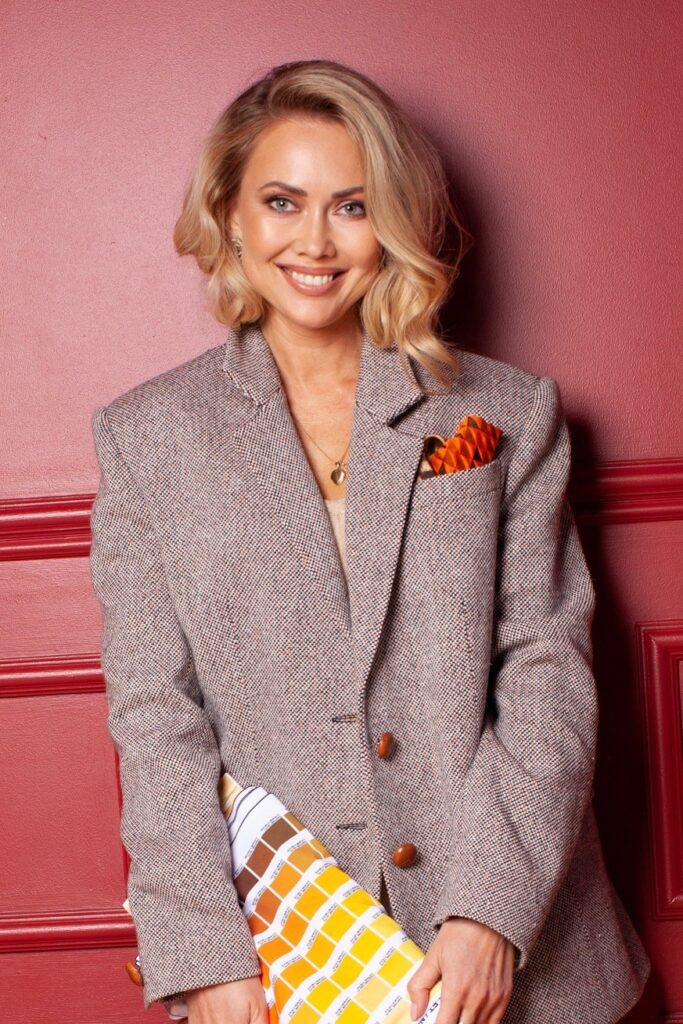Elena Gromova, Founder of Fashion Business Lab, NO.RAINER Luxembourg.
Elena, you have changed your successful career in Finance to Fashion. Could you tell us a little bit about your background and your journey from finance to fashion?
I spent over a decade working in finance in London in such companies as Deloitte, PwC and Universal Pictures. During that time, I developed a deep understanding of business operations, market trends, and financial strategy.
It was great to live in the city center of London and have a well paid prosperous career, but over the years I found myself becoming more and more interested in the creative industries, particularly, fashion. I was lacking an opportunity to express my creativity and I was dreaming to start my own business.
Why fashion?
Fashion is the most dynamic industry that combines beauty, aesthetics and creativity.
I’ve always had a passion for style and design, and at some point, I realized that I wanted to combine my business skills with this passion. My only problem was that I was scared and didn’t know how to make it happen.
So, how did you manage?
In 2015 I decided to go for a big challenge – participate in a well-known cycling competition L’étape de tour (part of Tour de France for non-professionals).
During this hard but exciting challenge I realized that we can do so much more then we think! In all possible areas. That was an eye-opening moment in my life which helped me to make a decision to launch my own fashion brand of cycling apparel for women. To combine my two passions to fashion and sports and finally start my own business.
That’s a fascinating shift! Moving from the fast-paced world of finance to a more creative industry must have been a big change. What challenges did you face making this transition?
It was definitely a big leap, and there were several challenges. First, I had to learn how the fashion industry operates in practical things like design processes, sourcing, the dynamics of fashion marketing, and understanding the intricacies of manufacturing. Fashion is an entirely different language compared to finance, and the first thing I did – I took a study course in Saint Martin’s, the leading school of Fashion in London. However, despite the fact that the course was very interesting, it was very theoretical and I still didn’t know how to design and where to produce my collection.
So, I had to learn all these things in practice. And, this led me in a few years to my current initiative – helping fashion startups to turn their ideas into successful fashion brands.
Another challenge was convincing myself that my financial background was an asset, not a hindrance. While I had to learn about fashion design and the creative side of the industry, my business expertise, especially in terms of financial planning, and strategic decision-making, proved to be a valuable asset. I’ve been able to bridge the gap between creative concepts and commercial viability, and currently, it helps me to develop business models for local fashion brands and entrepreneurs.
That’s a great point about leveraging your financial background in a creative industry. Please, tell us more about fashion industry in Luxembourg?
Luxembourg is a very attractive place because it’s often underestimated when it comes to fashion. It’s a small country, but it’s strategically located in the heart of Europe and is known for its stability, wealth, and internationalism, and there’s an increasing focus on diversifying the economy.
While the fashion industry is not as established here as in some larger cities, I saw this as an opportunity to make an impact. There is a growing interest in high-end fashion, sustainability, and local craftsmanship. Additionally, the business infrastructure in Luxembourg is excellent and there are great opportunities for entrepreneurs, government support and a strong cultural environment that’s open to new ideas and innovations.
You’ve mentioned sustainability and local craftsmanship, two topics that are gaining a lot of attention in the fashion industry today. How do you see these trends playing out in Luxembourg, and how are you helping to shape that future?
Luxembourg is increasingly aligning itself with sustainable business practices, and fashion is no exception. That’s a real push toward ethical fashion here, with consumers becoming more mindful of the environmental and social impact of what they wear. The demand for eco-friendly materials, transparent supply chains, and responsible production is growing.
My focus in Luxembourg has been on encouraging brands to adopt more sustainable practices. Whether it’s through the use of organic fabrics, reducing waste, or focusing on local production to minimize carbon footprints, there’s so much potential for Luxembourg to become a hub for sustainable fashion. I’ve been working with local designers to help them develop business models that prioritize sustainability without sacrificing creativity.
Moreover, Luxembourg has a thriving multicultural environment for nurturing emerging fashion talent while also introducing global perspectives.
That’s really exciting! It seems like you’re creating something new and valuable for the country. How do you see the fashion industry evolving in Luxembourg in the next 5 to 10 years?
I believe Luxembourg has the potential to become a notable player in the European fashion scene, particularly in the areas of sustainability, luxury, and innovation. We may not have the same scale as Paris or Milan, but Luxembourg’s unique position offers opportunities to build a distinctive fashion identity.
In the next 5 to 10 years, I see Luxembourg as a destination for high-quality, eco-conscious fashion brands where consumers value craftsmanship, sustainability, and design integrity. There is also the potential for Luxembourg to host more fashion-related events and festivals, which would further elevate the country’s visibility on the global stage.
Another important development will be the growth of digital platforms in fashion. E-commerce and digital marketing are already big trends, and I expect that Luxembourg-based brands will continue to expand their reach globally through these channels.
That’s amazing to hear your optimism about Luxembourg’s future in the fashion world. Finally, what advice would you give to others who are thinking about making a career change, especially into an industry as complex and competitive as fashion?
My advice would be to follow your passion but approach the transition strategically. The key is to combine what you know with what you want to learn. Don’t be afraid to step out of your comfort zone, but also be patient. A career change, especially one into a creative field like fashion, takes time.
I moved to Luxembourg almost three years ago and launched my second brand NO.RAINER two years ago to make Luxembourgish weather a bit brighter. I opened a pop up shop in the center of Luxembourg thanks to the government program supporting fashion startups.
And, now we are arranging a great event on the 21st of March in collaboration with AmCham to SUPPORT WOMEN IN BUSINESS! You are very welcome to our event to share your experience, listen to our incredible speakers and get a glass of bubbles!




